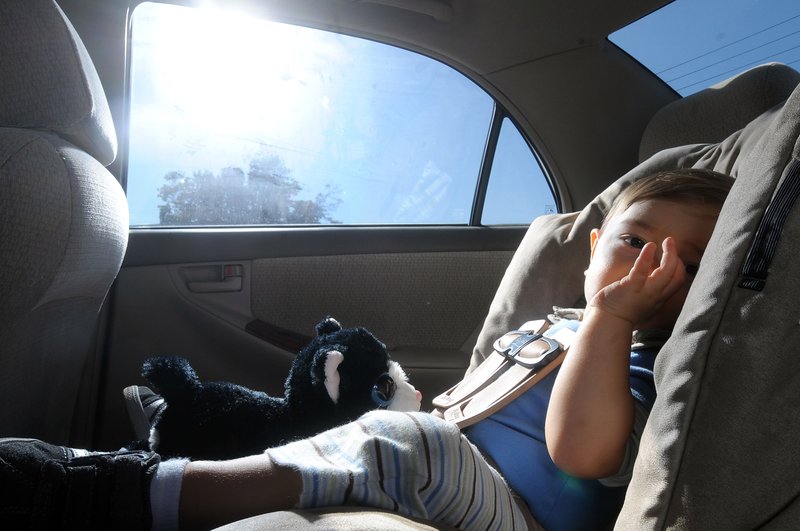FAYETTEVILLE -- As temperatures rise around the state they climb even higher inside cars, posing a serious danger to children or animals left inside.
In the United States, 19 states have laws that make it illegal to leave a child unattended in a vehicle, and at least 16 have laws against leaving animals in hot vehicles. Arkansas has neither.
June through August is the deadliest time for children left in vehicles, according to the National Highway Traffic Safety Administration.
A 5-year-old West Memphis boy died in June after his day care workers left him unattended in a van for eight hours. The high that day didn't quite reach 90, but inside the van, the temperature climbed to 141 degrees, police said.
On average, 37 children in the U.S. die of heatstroke each year, and 26 children have already died this year, according to the national nonprofit organization KidsAndCars. It bases its data on news reports, and when possible, the group's volunteers confirm the information independently with law enforcement, lawyers and families.
The death of the 5-year-old boy is unusual, statistically speaking. About 87 percent of vehicular heatstroke victims are 3 or younger. More than half are 1 or younger.
The prevalence of back seat, rear-facing car seats is one reason most of the victims are so young. The children are out of the driver's view and cannot communicate effectively or get out themselves, Amber Andreasen, director of KidsAndCars, said.
"'Look before you lock' is something we tell parents," she said. "Put something that you need throughout your day in the back seat to get in the habit of it."
Andreasen said she recommends always leaving your wallet or computer. "Take off your left shoe. You won't get far in the parking lot without it," she said.
Another reason most of the deaths involve young children is because a child's body temperature rises three to four times faster than an adult's. The younger children are, the less able their bodies are to regulate body temperature. Two-thirds of the increase in temperature happens within 10 minutes in non-air-conditioned vehicles, according to KidsAndCars.
"It could spell disaster in a matter of minutes," Andreasen said.
Other preventative measures are simple, she said.
While more than half of hot-car deaths happen when a caregiver forgets the child, a significant number happen when children climb into cars and no one knows, she said. So people should keep car doors locked, even if they don't have children, and keep keys out of reach, she said.
"The absolute worst thing you could do is think this wouldn't happen to your family," Andreasen said. "There are safety precautions everyone should take and they're so very worth it."
When it comes to pets, the easiest way to protect them is to leave them at home, officials said.
"Everybody likes to take their buddies with them, but they are going to be much safer at home," said Tony Rankin, Fayetteville Animal Services program manager. "We all say we are going to run into Wal-Mart and it's just going to take a few minutes, but you don't want to take that chance. In five minutes a dog can start to suffer from heat stress."
While there is no state law against leaving animals in vehicles, several cities have made it illegal.
In Fayetteville, it is illegal for anyone to confine an animal to an "unattended, enclosed vehicle where the outside temperature is 70 degrees or greater" when there is no air conditioning on or other measures to make sure the inside of the vehicle is 100 degrees or less, according to an ordinance the City Council passed unanimously in 2015.
Some other cities do not have ordinances that specifically address leaving animals in hot cars, but doing so can fall under ordinances regarding inhumane treatment or confinement of an animal.
Punishments vary, but someone found guilty can be fined up to $1,000 and sentenced to a year in jail for an animal cruelty first offense, said Melissa Reeves, a spokesman for the city of Springdale.
In Fayetteville, leaving an animal in the car can draw a fine up to $500, plus a fee to get the animal back from Animal Services.
Most animals are left in vehicles in shopping center or restaurant parking lots. Fayetteville Animal Services has responded to 64 complaints since March, with 22 so far this month, Rankin said.
"If you are in violation of the ordinance you will get a ticket," he said.
As for those good Samaritans who may want to rescue a hot puppy from a car, there is no law protecting them from being charged with a crime. Many states do have such laws, but Arkansas does not.
Metro on 07/22/2017
